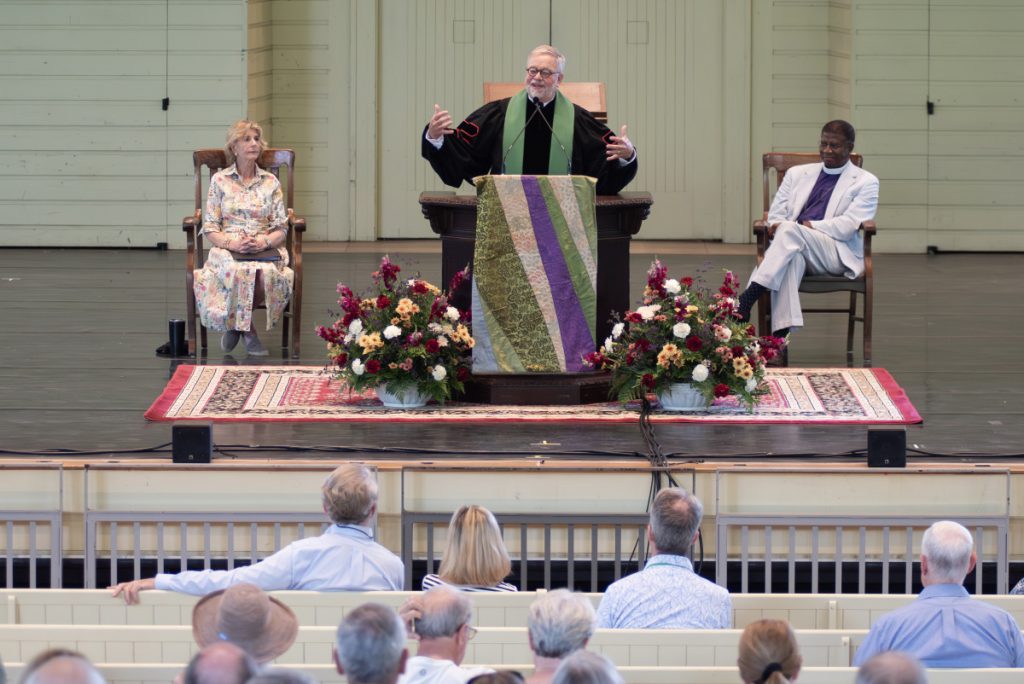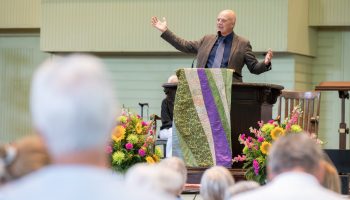
Column by Evans Nyamadzawo
Preaching from John 4:4–26, the story of Jesus and the Samaritan woman, the Rev. J. Peter Holmes delivered a sermon titled “Just Like That” that explored themes of inclusion, compassion and the need for genuine human connection. Holmes preached at the 9:15 a.m. morning worship service Friday in the Amphitheater.
Holmes reminded the congregation that the Samaritan woman was an outcast who came to the well at midday, forced by social stigma to avoid others. She had to come by herself at an odd time. Yet Jesus met her there, choosing not the easier, well-traveled route around Samaria, but deliberately passing through it. Holmes asked, “What does it mean if he goes by on the other side?” For Holmes, the encounter illustrated the radical way Christ refuses to exclude. “He doesn’t come to pile on the guilt,” he said. “He comes to embrace us in love.”
A Call to Be Good Samaritans
Holmes connected this story of the Samaritan woman to Jesus’ parable of the Good Samaritan, urging the congregation to follow Christ’s example of listening and caring. “He longs for us all to be good Samaritans,” Holmes said, “to be in relationship, to not assume we have nothing in common, but to share in a community of love.”
Citing scientific research that shows humanity shares 99.9% of its DNA, Holmes warned against divisions that fracture the human family. “We can’t let things tear us apart and break the sense of dignity we all share,” he said.
Polarization and Brokenness
Holmes lamented polarization within denominations and families, observing that even at annual assemblies or family gatherings, people often fail to engage in meaningful conversation. “We are born to be in relationship,” he said. “If we are not speaking, if we are not listening, in no time misinformation creeps in. Lies are born, fear grows, and hatred takes root.”
He named persistent forms of prejudice — antisemitism, anti-Black racism, and anti-Asian racism — as evidence of humanity’s refusal to truly listen to one another. “Jesus wants to be in conversation,” Holmes said. “Christ sees our brokenness. Jesus is here to share in our humanity, in our suffering.”
Holmes also drew on insights from his friend Karoline Lewis, whose writings on the Gospel of John emphasize Christ’s ministry as the Son who lived among people, fully sharing their struggles.
Stories of Community in Action
To illustrate his message, Holmes pointed to the witness of his friend Jon Allen, former Canadian ambassador to Israel, who continues to lead Project Rozana Canada, an initiative uniting healthcare workers even as hospitals in the region collapse. With only one hospital left, Allen has turned to supporting mobile medical vans, embodying a refusal to give up on building community and relationships. Holmes also recalled the principal of a Baptist seminary who, during the Lebanese civil war, invited both his congregation and their neighbors into the seminary for safety.
That act of hospitality gave rise to lasting friendships and eventually an annual interfaith dialogue between Muslim leaders and Baptist clergy — a testament, Holmes said, to the power of community in times of crisis.
Who Are Today’s Good Samaritans?
Closing his sermon, Holmes posed a searching question: “Who are we passing by on the other side? Who are today’s Good Samaritans?”
He illustrated his point with the story of a man who, after receiving a lifesaving heart transplant, spent years searching for the father of the donor. Holmes likened this to the heart of Jesus being transplanted into the body of Christ — believers beating in rhythm with God’s love.
Such love, he suggested, transforms those who appear to have nothing in common into a community reminiscent of the early church described in Acts, “a community that had all things in common.”
“May it be so,” Holmes concluded.
Melissa Spas, vice president for religion at Chautauqua Institution, presided. Paul Burkhart, read the scripture. The prelude was “Gabriel’s Oboe” by Ennio Morricone, arranged by Frederic Quinet, played by George Wolfe (saxophone) and Joseph Musser (piano). The Motet Choir sang “Jesus, thou joy of loving hearts” by Henry Baker, conducted by Laura Smith, organ scholar and accompanied by Owen Reyda, Organ Scholar. The postlude, performed by Reyda, was Orlando Augustinen Manfield. Support for this week’s preaching and chaplaincy is provided by the Alison and Craig Marthinsen Endowment for the Department of Religion. Mary Lee Talbot will return to her morning worship column this weekend.




